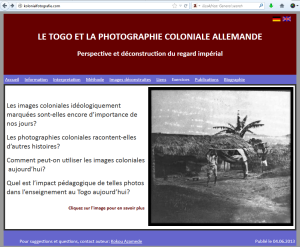Frankfurt University Library digitized some of the books and journals originally collected by the German Colonial Society (Deutsche Kolonialgesellschaft). The journals Deutsche Kolonialzeitung, Amtlicher Anzeiger für Deutsch-Ostafrika, Amtsblatt für das Schutzgebiet Deutsch-Südwestafrika, Amtsblatt für das Schutzgebiet Kamerun, Amtsblatt für das Schutzgebiet Togo and several books including even a colonial cook-book are available online.
Administration & everyday life in German colonies
 At the beginning of 2016 we could acquire digital black-and-white copies of
At the beginning of 2016 we could acquire digital black-and-white copies of
some official gazettes, like
and some more important historical sources like
German colonialism in books and images
 Additionally, some deluxe editions containing several images also in colour have been digitized:
Additionally, some deluxe editions containing several images also in colour have been digitized:
Some older accounts are documents of the pre-colonial and general history of colonialism:
- Caput bonae spei hodiernum : das ist: vollständige Beschreibung des Afrikanischen Vorgebürges der Guten Hofnung von Peter Kolben (1719)
- 3. Afrika, Die Länder und Völker der Erde oder vollständige Beschreibung aller fünf Erdtheile und deren Bewohner von Johann Andreas Christian Löhr, Leipzig (3rd edition 1819)

Die Länder und Völker der Erde oder vollständige Beschreibung aller fünf Erdtheile und deren Bewohner, Teil 3. Afrika / Johann Andreas Christian Löhr, 3., nach dem jetztigen politischen Stand der Dinge neu umgearb. Aufl., Leipzig : Fleischer, 1819, before page 269
Some of the works inter-relate with the Colonial Picture Archive:
 120 Kultur- und Vegetations-Bilder aus unseren deutschen Kolonien von Ferdinand Wohltmann (1904) shows images also available in the image archive. The caption below the pictures in the book offer much more detailed information than the meta-data in the Colonial Picture Archive, e.g. the image on page 14 shows the “Theobroma Cacao Linné” and explain details of cacao farming: “Man pflanzt ihn in Kamerun im Verband von 5×5 oder 5×4 oder 4×4 Meter und hat demnach 400 bezw. 500 bezw. 625 Bäumchen auf 1 Hektar.”
120 Kultur- und Vegetations-Bilder aus unseren deutschen Kolonien von Ferdinand Wohltmann (1904) shows images also available in the image archive. The caption below the pictures in the book offer much more detailed information than the meta-data in the Colonial Picture Archive, e.g. the image on page 14 shows the “Theobroma Cacao Linné” and explain details of cacao farming: “Man pflanzt ihn in Kamerun im Verband von 5×5 oder 5×4 oder 4×4 Meter und hat demnach 400 bezw. 500 bezw. 625 Bäumchen auf 1 Hektar.”
Further individual works were digitized in lower quality during the course of the preparation for interlibrary loans. Finally, the Deutsches Kolonial-Lexikon by Heinrich Schnee (1920) has been completely digitized. This invaluable contemporary source – published in 1914 and 1920 respectively by the Governor of German East Africa – is full-text searchable and the index words are linked by hypertext (click on “Deutsches Kolonial-Lexikon 1920” at the website of picture archive).
The Special Collection
During the second half of the 19th century numerous societies arose that concerned themselves with caring for German emigrants, and spreading of colonial ideas. The colonial library consists of the libraries of several colonial societies. The most important was the “German Colonial Society” (Deutsche Kolonialgesellschaft, DKG) founded in 1887. For their propaganda activities its members collected not only books (ca. 18,000) and journals, but also more than 50,000 photographs (mainly lantern slides), which were used to illustrate their publicity lectures in Germany. The Colonial Picture Archive is already online since 2004, and includes also the collection of photographs, photo albums and postcards owned by the Sam Cohen Library, Swakopmund, Namibia.
The special collection “Colonial Library” with the signatures S 17, Sq 17, and Sf 17, stemming mainly from the library of the German Colonial Society and the Imperial Colonial Office, is completely listed in the Online Catalogue and can be searched by means of the original subject classification. In addition, the catalogue of the Colonial Library is available online as a PDF file: Volume 1 contains the alphabetical division and Volume 2 the division according to the arrangement of the catalogue of the German Colonial Society library.
The books in the collection suffer a lot of acid deterioration (see an example). Therefore usage of the books is restricted to the special reading room.
Please note: Due to German copyright restrictions and other contractual obligations some of the digitized works can only be accessed at the premises of Frankfurt University library.









 Frankfurt University Library is most happy to continue its special collection on Africa in the new era of the “Specialised Information Services” funding programme.
Frankfurt University Library is most happy to continue its special collection on Africa in the new era of the “Specialised Information Services” funding programme.









 Just head to
Just head to 


 Harvard University and the Massachusetts Institute of Technology (MIT) created a new online-learning experience with online courses at
Harvard University and the Massachusetts Institute of Technology (MIT) created a new online-learning experience with online courses at  OER Africa
OER Africa